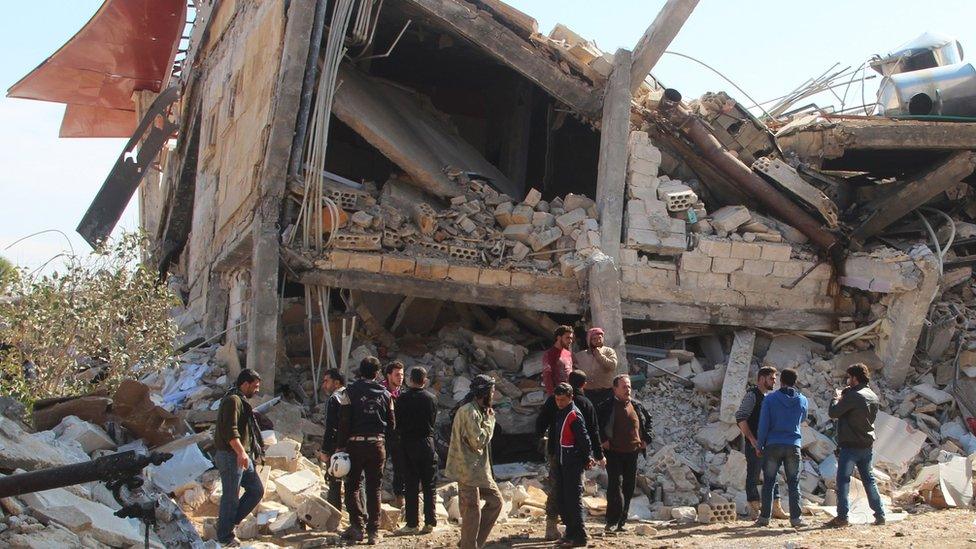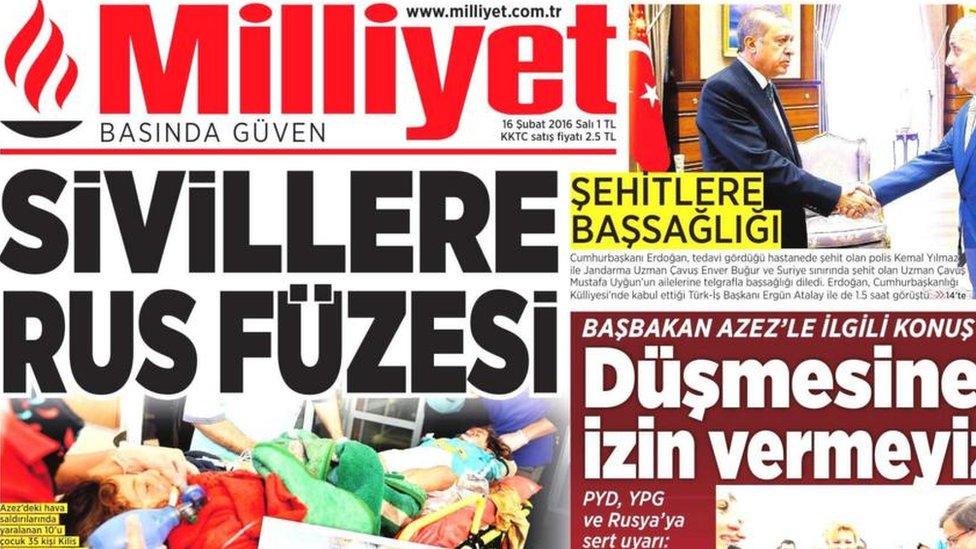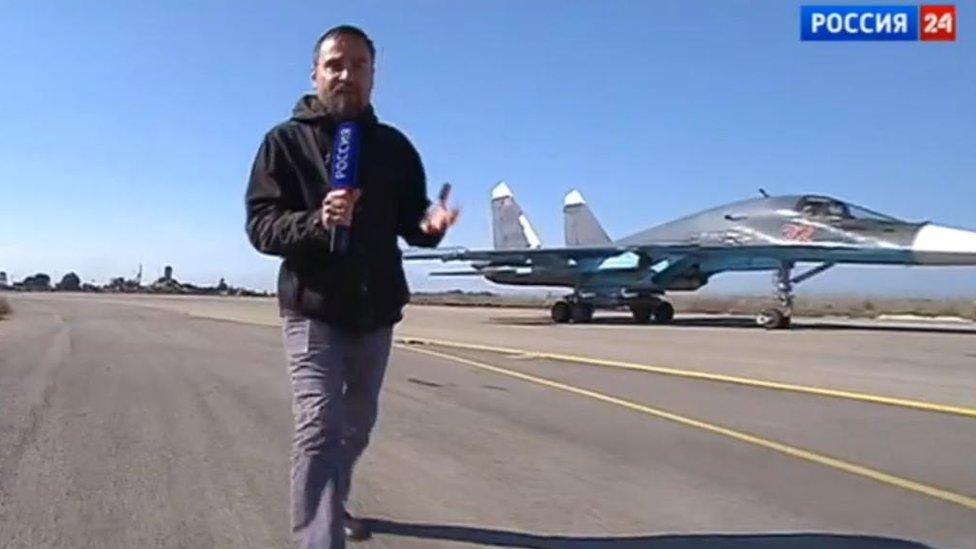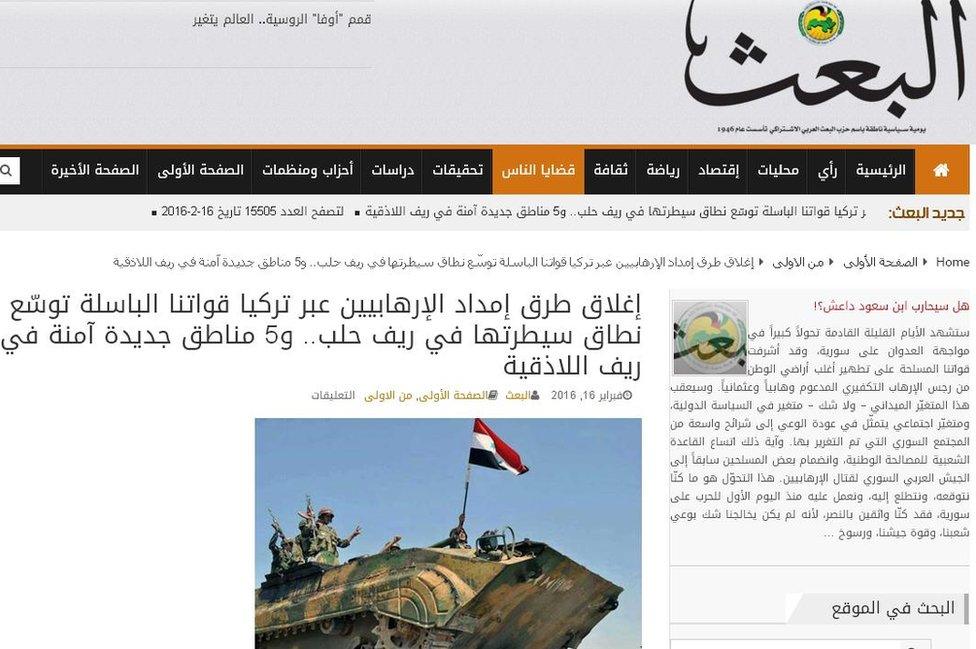Syria crisis: Media fear escalation
- Published

Russia is accused of striking hospitals in northern Syria with missiles, but denies this
Newspapers in the Middle East and elsewhere are voicing alarm at what they see as a potential dangerous escalation in Syria.
In Turkey, newspapers vent their anger at Russia, blaming it for air strikes on Monday on hospitals and a school in northern Syria that left up to 50 people dead.
The Hurriyet, external and HaberTurk , externaltabloids carry pictures of children wounded in the strikes on their front pages, with both linking the attacks to Russia.

Turkish papers largely echo their government's line accusing Russia of the hospital strikes
"Russian missile against civilians," is the headline in another tabloid, Milliyet, external.
The view is picked up elsewhere in the Middle East, especially in countries whose governments are hostile to the regime of Syrian President Bashar al-Assad and Russia's support for him.
"The Russian president uses Sukhoi fighter jets to destroy the Middle East," Mazen Hammad writes in Qatar's pro-government Al-Watan, external.
'Perfectly precise'
In Russia, the state media have been largely ignoring allegations - now denied by a Kremlin spokesman - that Russian forces carried out the air strikes on the hospitals.

Rossiya TV's report says Russia is using "perhaps the world's best fighter" - the Su35 - against "terrorists"
Pro-Kremlin TV stations focus instead on reports that Moscow plans to raise Turkish air strikes on Kurdish fighters at the UN.
This is combined with their usual glowing coverage of Russia's own bombing campaign against "terrorists" - the blanket term used by Damascus and Moscow for all armed opponents of President Assad.
"Perhaps the best bombers in the world," state-owned Rossiya 1 says in an upbeat report, external about Russian Sukhoi Su-35 aircraft. "Perfectly precise strikes - day and night."
Syria's state media praise Russia's role in Syria, while accusing Turkey of supporting "terrorists".

Syrian pro-regime paper Al-Baath praises advances made against the rebels with Russian help
"Joint Russian-Syrian operations will not stop," Al-Baath, external - the mouthpiece of the ruling Baath Party - says, and goes on to predict a "strategic turning point" in the fight against rebels.
In Iran - an ally of President Assad - a commentary in Arabic-language daily Vefagh, external says the Turkish intervention in Syria, and reported plans for a Saudi presence, show both countries' desperation at the success of pro-Assad forces.
"Saudi-Turkish hysteria is mounting as the Syrian army is tightening its siege on Aleppo," the commentator, Feiroz Baghdadi, says.
'War order'
In the wider Middle East, many commentators express concern about the chances of a serious international conflict erupting.
A commentary in Jordan's Al-Dustour, external daily says the growing military involvement of both Russia and Turkey is a "serious development".
"The war has been transformed from one between a regime and its allies on the one hand and militias directly backed by a number of states on the other, to something similar to a 'global' war that might push all parties to the abyss," the writer, Hussein al-Rawashda, argues.
In the Turkish daily Zaman, external, Gokhan Bacik also paints a picture of a wider regional conflagration in the making.
"Countries in the Middle East have arranged themselves in a 'war order' now," he writes. "The pacts, blocs, and even possible fronts are set."
But in the Lebanon anti-Assad daily Al-Mustaqbal, external, Ali Nun argues that while a direct confrontation between Turkey and Russia in Syria is a "realistic possibility", it is still unlikely, unless "[President Vladimir] Putin goes mad and comes to believe that protecting Assad is worth such huge devastation".
BBC Monitoring reports and analyses news from TV, radio, web and print media around the world. You can follow BBC Monitoring on Twitter, external and Facebook, external.
- Published7 January
